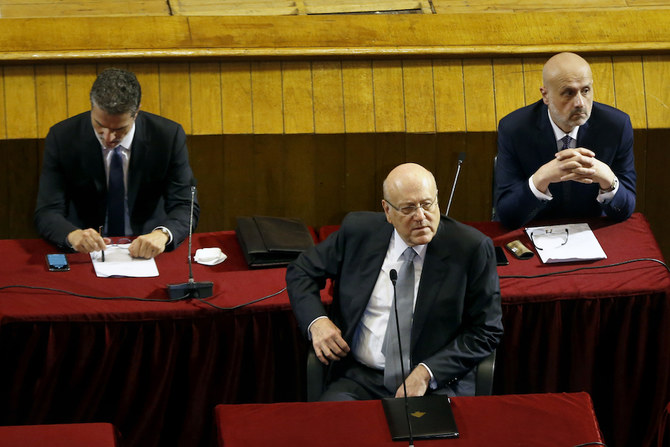BEIRUT: Lebanon’s parliament has backed the Mikati government in a vote of confidence held on Monday at the UNESCO palace following a power outage and a broken generator that briefly delayed the start of the session.
Some 40 minutes passed before electricity returned thanks to a private generator brought by Hezbollah. It used non-Iranian diesel despite the party’s readiness to secure supplies from Tehran.
Lebanon on Monday morning endured a major power failure due to low production and poor distribution, which led to outages across the country.
The session had been scheduled to start at 11 a.m. but the lights went out in the building now housing the parliament.
MPs were broadcasting on live television waiting inside and outside the hall while the electricity was down.
The incident, which underscored the deep crisis roiling the small country amid an unprecedented economic meltdown, was derided on social media, with some activists and media figures saying they were glad politicians were getting a taste of the suffering.
Hezbollah’s MP Ibrahim Al-Moussawi said: “We had made contacts to secure a generator which was sent to the UNESCO palace. We were ready to secure diesel from Al-Amana Fuel Company, however the secretary general of the house of representatives Adnan Dahir, informed us that the diesel is available and they just needed a generator.”
The new government of Prime Minister Najib Mikati has said its permission was not sought regarding the import of Iranian diesel. Ships carrying the Iranian diesel arrived in the Syrian port of Banias last week and lorries carrying Syrian plates entered Lebanon through unofficial border crossings that Hezbollah had built in the decade since the Syrian civil war erupted.
Hezbollah stored the diesel in tanks in the Baalbek area owned by Al Amana fuel company that has been under US sanctions since February 2020 due to its ties to Hezbollah. The diesel will be distributed free of charge to government hospitals, with the remaining quantities expected to be sold below the state’s price.
Lebanon is battling a deep depression, with worsening fuel shortages translating into few or any hours of state-backed power each day. Most Lebanese rely on private generators for electricity.
In parliament, Mikati read out the Cabinet’s draft policy program: “From the heart of the suffering of Beirut ... our Cabinet was born to light a candle in this hopeless darkness.”
The new premier also vowed to hold timely and transparent elections in May 2022.
He also pledged to “resume talks with the IMF and develop a plan to revive the economy, adopting a short- and medium-term rescue program starting from the recovery plan after it has been updated with the implementation of reforms in all areas in accordance with urgent priorities.”
He said that the economic plan will be implemented in coordination with the Bank of Lebanon after it has been approved by the government.
Mikati promised to “draw up a plan to reform the banking sector, to pass in cooperation with parliament the Capital Control Act and draft a bill to address the financial and banking conditions that emerged after Oct. 17, 2019, particularly those related to the transfer of funds abroad and the recovery of funds from corruption offences.”
Mikati’s government will also resume negotiations with creditors over a restructuring of public debt on which Lebanon defaulted last year.
Mikati promised that his government would “strengthen and uphold Lebanon’s relations with sister Arab countries and insist, as well as strengthening Lebanon’s international relations and activating its engagement with the international community and its European partner.”
Mikati pledged to “close illegal crossings, reduce tax evasion, amend the Public Accounting Act and complete the 2022 general budget, including its reform clauses dealing with public finances.”
Mikati also promised to “increase electricity supply hours in the first phase, complete the implementation of the electricity sector plan and related reforms with its modernization and the establishment of the country’s needed power plants with the participation of the private sector, and complete the project of bringing natural gas through Floating Storage Regasification Units.”
In its ministerial statement, the government stressed its “efforts to secure an economic- socio-health safety net to restore purchasing power, activate social guarantor institutions, expand insurance coverage of all kinds, put the cash card program into effect in coordination with the ESSN social safety net program for the neediest families and adopt the Old Age Security Act.”
As for the Beirut port explosion, the government stressed its “keenness to complete all investigations to determine the causes of the explosion, uncover the full truth and punish all perpetrators.”
The Lebanese Forces parliamentary bloc voted against granting Mikati’s Cabinet confidence. “We will not bet on this government to do miracles. This government was formed to stop the collapse, prevent the explosion and, most importantly, it is an election government,” said MP Strida Geagea.
Hezbollah MP Mohammed Fadlallah called for a “criminal financial audit of companies that exercised monopoly,” criticizing “banks that stole the Lebanese savings, urging them to return these savings and assume their responsibilities.”
The head of the Strong Lebanon bloc, MP Gebran Bassil, said his bloc would give the government confidence “because the government was duly formed. The prime minister respected the constitutional partnership with the president of the republic. It has also included in its ministerial statement our demands and this is a positive thing.”
However, a dispute took place between Bassil and deputy speaker of parliament, MP Eli Ferzli, over Bassil’s accusation that a number of deputies and ministers had “transferred their funds abroad.”
“The parties who disrupted the country are the ones who formed the government under the auspices of Hezbollah. The latter is in full control of the council and there is no possibility of any reform. The big confrontation will be in the next elections, so that the people can overthrow this system,” said Sami Gemayel, Lebanese Kataeb Party chief, who resigned from parliament.
























